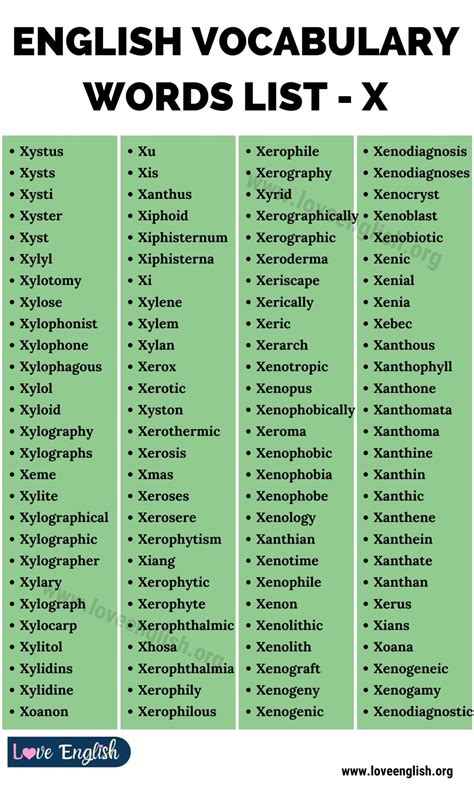Mastering the art of vocabulary expansion is crucial for effective communication, whether in personal or professional settings. Words that begin with the prefix "ex" are particularly useful in conveying a range of meanings, from exclusion and exemption to expertise and examination. Here, we will delve into eight words that start with "ex" to enhance your linguistic arsenal.
The Power of "Ex" in Vocabulary Expansion
Understanding words that begin with "ex" can significantly improve your communication skills. From expressing exclusion and exemption to highlighting expertise and examination, the "ex" prefix offers a versatile range of meanings. In this article, we will explore eight essential words that start with "ex," providing you with a deeper understanding of their meanings, usage, and contexts.

1. Exemplary
Exemplary refers to something or someone that serves as a model or example of excellence. It is often used to describe exceptional performance, behavior, or quality.
Example: "Her exemplary leadership skills earned her a promotion within a year."
2. Exuberant
Exuberant describes someone or something that is full of energy, enthusiasm, and excitement. It is often used to convey a sense of lively and vibrant behavior.
Example: "The exuberant crowd cheered as the concert began."
3. Exacting
Exacting refers to demanding or requiring a great deal of effort, precision, or attention to detail. It is often used to describe tasks, standards, or expectations that are rigorous and uncompromising.
Example: "The exacting standards of the competition required months of preparation."
4. Expendable
Expendable describes something or someone that can be used up or sacrificed without significant loss or consequence. It is often used to convey a sense of disposability or replaceability.
Example: "The company considered the new employee expendable and easily replaceable."
5. Exhilarating
Exhilarating describes an experience or activity that is thrilling, exciting, or uplifting. It is often used to convey a sense of euphoria or elation.
Example: "The exhilarating ride on the roller coaster left me screaming with delight."
6. Exogenous
Exogenous refers to something that originates from outside a system, organization, or individual. It is often used to describe external factors, influences, or sources.
Example: "The exogenous factors affecting the company's performance included economic trends and government regulations."
7. Expiate
Expiate means to make amends or atone for a wrong or guilt. It is often used to convey a sense of repentance or reparation.
Example: "The company sought to expiate its past mistakes by implementing new sustainability policies."
8. Exposition
Exposition refers to a detailed explanation or presentation of an idea, concept, or plan. It is often used to convey a sense of clarity, coherence, and logical structure.
Example: "The professor's exposition on the topic of climate change was clear, concise, and compelling."



Conclusion
In conclusion, mastering words that begin with the prefix "ex" can significantly enhance your vocabulary and communication skills. By understanding the meanings, usage, and contexts of these eight essential words, you can express yourself more effectively and confidently in various personal and professional settings. Remember to practice using these words in your daily conversations and writing to reinforce your learning and expand your linguistic arsenal.
What are some other "ex" words that you find useful in your daily communication? Share your thoughts and suggestions in the comments section below. Don't forget to share this article with your friends and family to help them expand their vocabulary as well.
FAQ
What is the meaning of the prefix "ex"?
+The prefix "ex" often means "out" or "outside," but it can also convey a sense of exclusion, exemption, or extension.
How can I expand my vocabulary effectively?
+Expanding your vocabulary requires practice, patience, and persistence. Read widely, learn new words daily, and use flashcards to reinforce your learning.
What are some common mistakes to avoid when using "ex" words?
+Common mistakes include misusing "ex" words that sound similar, such as "exuberant" and "exigent," or using them in incorrect contexts.
